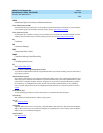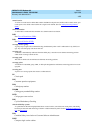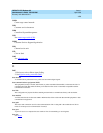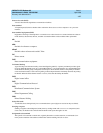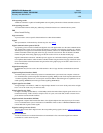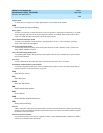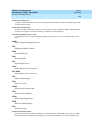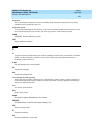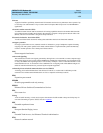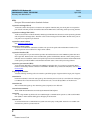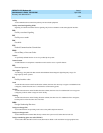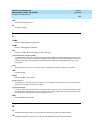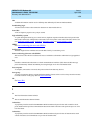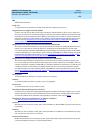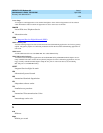
DEFINITY ECS Release 8.2
Administrator’s Guide
555-233-506
Issue 1
April 2000
Glossary and abbreviations
1632
EIA-232
A physical interface specified by the EIA. EIA-232 transmits and receives asynchronous data at speeds of up
to 19.2 kbps over cable distances of up to 50 feet. EIA-232 replaces RS-232 protocol in some DEFINITY
applications.
electronic tandem network (ETN)
A tandem tie-trunk network that has automatic call-routing capabilities based on the number dialed and the
most preferred route available. Each switch in the network is assigned a unique private network office code
(RNX), and each voice terminal is assigned a unique extension.
Electronics Industries Association (EIA)
A trade association of the electronics industry that establishes electrical and functional standards.
emergency transfer
If a major system failure occurs, automatic transfer is initiated to a group of telephones capable of making
outgoing calls. The system operates in this mode until the failure is repaired and the system automatically
returns to normal operation. Also called power-failure transfer.
EMI
Electromagnetic interference
end-to-end signaling
The transmission of touch-tone signals generated by dialing from a voice terminal to remote computer equip-
ment. These digits are sent over the trunk as DTMF digits whether the trunk signaling type is marked as tone
or rotary and whether the originating station is tone or rotary. Example: a call to a voice-mail machine or auto-
mated-attendant service. A connection is first established over an outgoing trunk. Then additional digits are
dialed to transmit information to be processed by the computer equipment.
enhanced private-switched communications service (EPSCS)
An analog private telecommunications network based on the No. 5 crossbar and 1A ESS that provides
advanced voice and data telecommunications services to companies with many locations.
EPN
Expansion-port network
EPROM
Erasable programmable read-only memory
EPSCS
Enhanced Private Switched Communications Services
ERL
Echo return loss
Erlang
A unit of traffic intensity, or load, used to express the amount of traffic needed to keep one facility busy for
one hour. One Erlang is equal to 36 CCS. See also capability.
ESF
Extended superframe format
ESPA
European Standard Paging Access
ETA
Extended Trunk Access; also Enhanced Terminal Administration
ETN
Electronic tandem network



